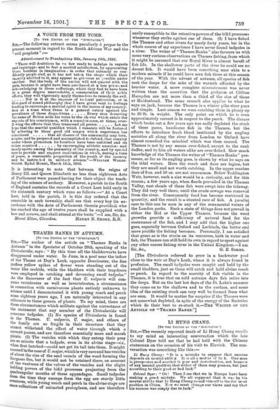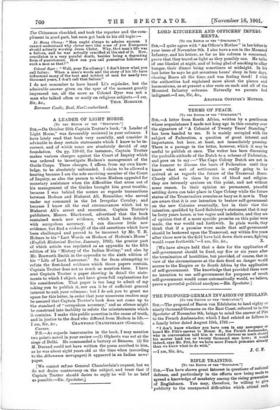LI HUNG CHANG.
(To THE EDITOR OF THE SPE:TATOR:1
San,—The recently reported death of Li Hung Chang recalls to my mind an interesting conversation which the late Colonel Dyer told me that he had held with the Chinese statesman on the occasion of his visit to Elswick. The con- versation was something like this :—
Li Hung Chang: "It is a mistake to suppose that success depends on mental abili.y. It is all a matter of lu k. One man is prosperous and another is poor and downtrodden, not because of any mental qualities that either of them may possess, but just according to their good or bad luck."
Colonel Dyer: " Oh! Then I see that we in Europe have been making a great mistake. We all suppo4e4 that it we+ by his mental ability that Li Hung Chang raised himself to the for most position in China. Now we must change our views and say that his success was ;simply due to luck."
The Chinaman chuckled, and took the repartee and the com- pliment in good part, but soon got back to his old topic :—
Li Hung Chang: "Men ought always to admire success. I cannot understand why clever men like some of you Europeans should actually worship Jesus Christ. Why, that man's life was a failure, and he was actually crucified at the end of it. Now, crucifixion is a very painful death, besides being a degrading form of punishment. How can you call yourselves followers of such a man as that?"
Colonel Dyer : "Well, your Excellency ! I don't know what you call failure. When a man's words and the story of his life have influenced many of the best and noblest of men for nearly two thousand years, I don't call that failure."
I do not remember to have heard Li's rejoinder, but the admirable answer given on the spur of the moment greatly impressed me, all the more as Colonel Dyer was not a man who talked often or easily on religious subjects.—I am,
Sir, &c., THOS. HODGKIN. Barmoor Castle, Beal, Noraumberland.



























































 Previous page
Previous page